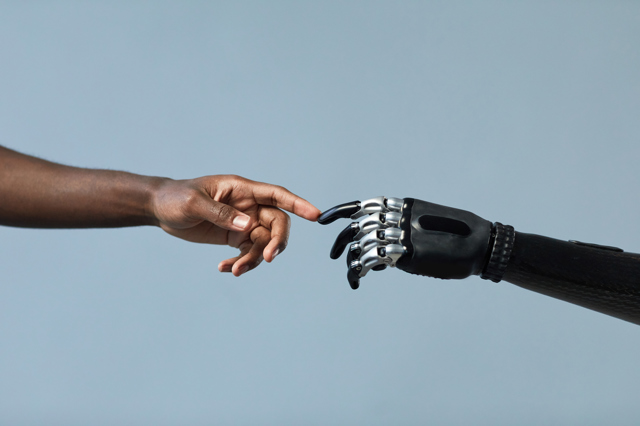< Back to news
With examples such as the large-scale deployment of smart drones by Ukraine and the autonomous detection of missiles by Israel's Iron Dome system, we see a rapidly evolving landscape in which AI plays an increasingly important role on the battlefield. These developments bring new challenges, where traditional rules of war and international law may no longer be sufficient.
Kwik's research highlights the complexity of AWS and raises important questions about how these systems fit within the existing legal framework of warfare. The autonomy of these systems, their ability to make independent decisions, and the unpredictability of their actions all contribute to the challenge of applying traditional principles of responsibility.
This issue requires in-depth discussion and awareness, not only within military and legal circles, but also among the broader public. As we move into the future of warfare, we must continue the dialogue on leveraging AI's benefits without losing sight of our ethical principles and responsibilities.
The full article in Het Parool provides an in-depth analysis of these issues and is a must-read for anyone interested in the intersectionality of technology, ethics and warfare. It invites us to think about the future we want to shape and how we can navigate the challenges ahead with wisdom and prudence.
Read more here.
Published by Het Parool.


20 February 2024
Between Innovation and Ethics: AI-Driven Weapons Under the Scrutiny
At a time when artificial intelligence (AI) is gaining traction, we are at a critical crossroads where technological advances are challenging our traditional views on warfare.
The recent research of war law lawyer Jonathan Kwik, presented in an article by Het Parool, shines a spotlight on this complex issue, specifically focusing on the implications of autonomous weapon systems (AWS) and the need for human control.
With examples such as the large-scale deployment of smart drones by Ukraine and the autonomous detection of missiles by Israel's Iron Dome system, we see a rapidly evolving landscape in which AI plays an increasingly important role on the battlefield. These developments bring new challenges, where traditional rules of war and international law may no longer be sufficient.
Kwik's research highlights the complexity of AWS and raises important questions about how these systems fit within the existing legal framework of warfare. The autonomy of these systems, their ability to make independent decisions, and the unpredictability of their actions all contribute to the challenge of applying traditional principles of responsibility.
This issue requires in-depth discussion and awareness, not only within military and legal circles, but also among the broader public. As we move into the future of warfare, we must continue the dialogue on leveraging AI's benefits without losing sight of our ethical principles and responsibilities.
The full article in Het Parool provides an in-depth analysis of these issues and is a must-read for anyone interested in the intersectionality of technology, ethics and warfare. It invites us to think about the future we want to shape and how we can navigate the challenges ahead with wisdom and prudence.
Read more here.
Published by Het Parool.
Vergelijkbaar >
Similar news items

7 December 2024
Booking.com in the top 3 of the Dutch R&D Top 30
Great news! Booking.com is now in the top 3 of the Dutch R&D Top 30, with nearly €420 million in R&D investments. Our significant contributions to research and development, including investments in AI, are making a substantial impact on the innovation strength of the Netherlands.
read more >

6 December 2024
ELLIS Unit Amsterdam Hosts Third Annual NeurIPS Fest
On November 28, 2024, the ELLIS Unit Amsterdam hosted its third annual NeurIPS Fest at LAB42, attracting 120 participants and showcasing 25 posters. Co-organized with the ELLIS Units in Nijmegen and Delft, the event brought together AI/ML researchers from across the Netherlands for a vibrant and collaborative gathering.
read more >

6 December 2024
Advanced AI for Surveillance Robots
At LAB42, their addressing tomorrow’s challenges today. One pressing question is: how can we tackle the growing staff shortage in security?
read more >